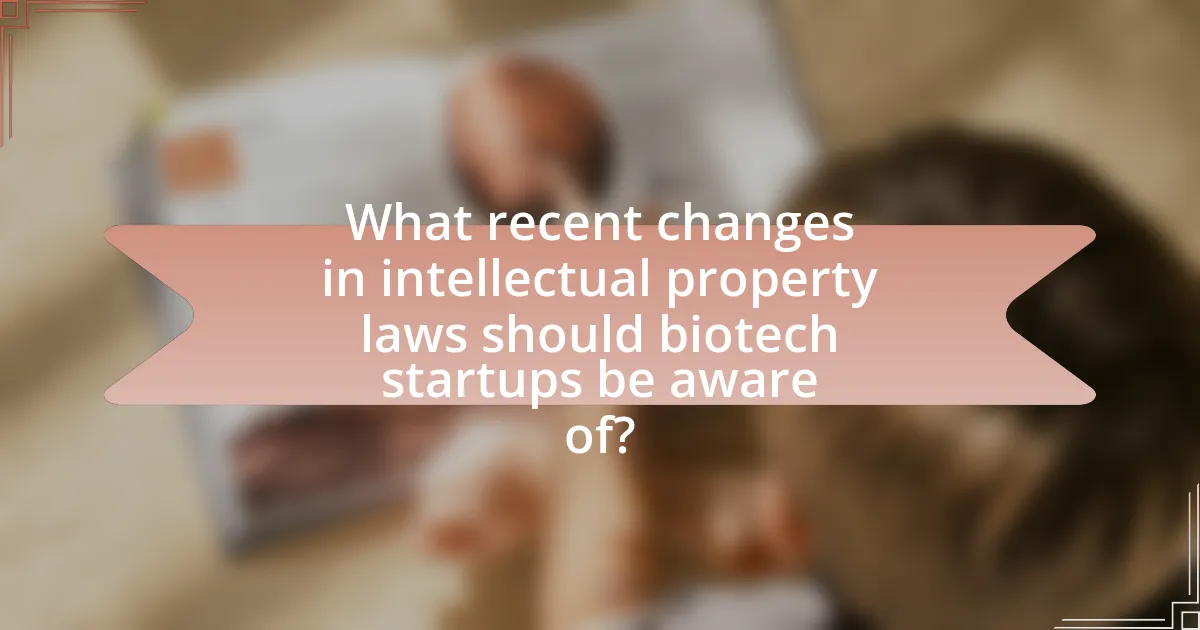The article examines the impact of changes in intellectual property (IP) laws on biotech startups, highlighting how these laws influence funding opportunities, innovation, and competitive advantage. Key areas of focus include patent law, trade secret law, and regulatory exclusivity provisions, which collectively shape the operational landscape for biotech firms. The article also discusses the implications of recent legislative changes, emerging trends in IP law, and strategies for startups to navigate evolving regulations effectively. Additionally, it emphasizes the importance of strong IP protections in attracting investment and fostering innovation within the biotech sector.

How do changes in intellectual property laws impact biotech startups?
Changes in intellectual property laws significantly impact biotech startups by influencing their ability to secure funding and protect innovations. Stronger intellectual property protections can enhance investor confidence, as they ensure that startups can safeguard their proprietary technologies and research. For instance, a study by the National Bureau of Economic Research found that biotech firms with robust patent portfolios attracted 30% more venture capital compared to those with weaker protections. Conversely, changes that weaken intellectual property rights can deter investment, as potential investors may perceive a higher risk of intellectual theft or competition. Therefore, the landscape of intellectual property laws directly shapes the operational viability and growth potential of biotech startups.
What are the key intellectual property laws affecting biotech startups?
The key intellectual property laws affecting biotech startups include patent law, trade secret law, and regulatory exclusivity provisions. Patent law allows biotech startups to protect their inventions, such as new drugs or biotechnological processes, by granting exclusive rights for a limited time, typically 20 years from the filing date. Trade secret law enables these companies to safeguard confidential information, such as formulas or manufacturing processes, that provides a competitive edge. Additionally, regulatory exclusivity provisions, such as those found in the Hatch-Waxman Act and the Biologics Control Act, provide periods of market exclusivity for new drugs and biologics, further incentivizing innovation in the biotech sector. These laws collectively create a framework that encourages investment and development in biotechnology by ensuring that startups can protect their innovations and recoup their research and development costs.
How do patent laws influence innovation in biotech?
Patent laws significantly influence innovation in biotech by providing exclusive rights to inventors, which incentivizes research and development. These laws enable biotech companies to secure funding by demonstrating potential market exclusivity, thus attracting investors who are willing to finance high-risk projects. For instance, the Bayh-Dole Act of 1980 in the United States allowed universities and small businesses to retain ownership of inventions developed with federal funding, leading to a surge in biotech patents and innovations. This legal framework fosters a competitive environment where companies are motivated to innovate to maintain their market position and profitability.
What role do trade secrets play in the biotech industry?
Trade secrets play a crucial role in the biotech industry by protecting proprietary information that gives companies a competitive edge. This includes formulas, processes, and research data that are not publicly disclosed, allowing firms to maintain their innovations and market position. For instance, the Biotechnology Innovation Organization (BIO) highlights that trade secrets can be more advantageous than patents for certain biotech processes, as they do not require public disclosure and can last indefinitely as long as confidentiality is maintained. This protection encourages investment in research and development, as companies can safeguard their discoveries from competitors, thus fostering innovation within the industry.
Why are intellectual property rights crucial for biotech startups?
Intellectual property rights are crucial for biotech startups because they protect innovations and provide a competitive advantage in a highly specialized industry. These rights enable startups to secure patents for their unique biotechnological inventions, which can lead to exclusive market access and the potential for significant financial returns. For instance, a study by the Biotechnology Innovation Organization (BIO) found that companies with strong intellectual property protections are more likely to attract investment, as investors seek assurance that their funding will support proprietary technologies. This legal framework not only incentivizes research and development but also fosters collaboration and partnerships, essential for growth in the biotech sector.
How do IP rights affect funding opportunities for biotech startups?
IP rights significantly enhance funding opportunities for biotech startups by providing legal protection for innovations, which increases investor confidence. When a biotech startup holds strong intellectual property rights, such as patents, it demonstrates the potential for exclusive market access and revenue generation, making it more attractive to venture capitalists and other funding sources. According to a study by the National Bureau of Economic Research, startups with patented technologies are 50% more likely to secure funding compared to those without patents, highlighting the critical role of IP rights in attracting investment.
What is the relationship between IP protection and competitive advantage in biotech?
IP protection is crucial for establishing competitive advantage in biotech by safeguarding innovations and enabling exclusive market access. Strong intellectual property rights allow biotech firms to secure patents on novel drugs and technologies, which can lead to significant financial returns and market leadership. For instance, a study by the Biotechnology Innovation Organization indicates that companies with robust IP portfolios are more likely to attract investment and partnerships, enhancing their market position. Thus, effective IP protection directly correlates with a biotech firm’s ability to maintain a competitive edge in a rapidly evolving industry.
How do changes in IP laws create challenges for biotech startups?
Changes in IP laws create challenges for biotech startups by altering the landscape of patent protection and enforcement, which can hinder innovation and investment. For instance, stricter patentability criteria may limit the ability of startups to secure patents for novel biotechnological inventions, thereby reducing their competitive edge. Additionally, changes that extend the duration of patent protection can lead to increased costs for startups, as they may face prolonged exclusivity from larger firms that can afford to navigate complex legal frameworks. According to a study by the National Bureau of Economic Research, shifts in IP laws have been linked to a decrease in venture capital funding for biotech firms, indicating that uncertainty in IP regulations can deter investment.
What are the potential risks of stricter IP regulations for biotech companies?
Stricter intellectual property (IP) regulations pose significant risks for biotech companies, primarily by increasing operational costs and limiting innovation. These regulations can lead to heightened legal expenses as companies navigate complex compliance requirements, diverting resources away from research and development. Additionally, stricter IP laws may stifle collaboration between firms and academic institutions, as the fear of litigation can inhibit knowledge sharing and joint ventures. Historical data indicates that in regions with stringent IP enforcement, such as the European Union, biotech innovation has slowed, with fewer new therapies reaching the market compared to more flexible regulatory environments. This trend underscores the potential negative impact of stringent IP regulations on the biotech sector’s ability to innovate and compete effectively.
How can biotech startups adapt to evolving IP landscapes?
Biotech startups can adapt to evolving IP landscapes by implementing flexible IP strategies that include continuous monitoring of legal changes and engaging in proactive patent management. This approach allows startups to identify emerging trends in IP law, such as shifts in patent eligibility criteria or changes in enforcement practices, which can significantly impact their innovation processes. For instance, the U.S. Supreme Court’s decision in Mayo Collaborative Services v. Prometheus Laboratories (2012) reshaped the patentability of diagnostic methods, prompting biotech firms to reassess their IP portfolios and focus on alternative protection mechanisms like trade secrets or regulatory exclusivities. By staying informed and agile, biotech startups can navigate the complexities of IP law and maintain a competitive edge in the market.

What recent changes in intellectual property laws should biotech startups be aware of?
Recent changes in intellectual property laws that biotech startups should be aware of include the expansion of patent eligibility criteria and increased scrutiny on patent applications. The U.S. Supreme Court’s decision in Amgen v. Sanofi clarified that enablement requirements for patent claims must be met, impacting how biotech companies draft their applications. Additionally, the U.S. Patent and Trademark Office has implemented new guidelines for artificial intelligence-related inventions, which may affect biotech startups utilizing AI in their research and development processes. These changes emphasize the importance of thorough patent preparation and the need for biotech startups to stay informed about evolving legal standards to protect their innovations effectively.
How have recent legislative changes affected patent filing processes?
Recent legislative changes have streamlined patent filing processes by reducing application fees and expediting examination timelines. For instance, the implementation of the America Invents Act in 2011 introduced a first-to-file system, which encourages quicker submissions and has led to a significant increase in patent applications, with the United States Patent and Trademark Office reporting a 20% rise in filings since its enactment. Additionally, the introduction of electronic filing systems has further simplified the process, allowing biotech startups to submit applications more efficiently and access resources that facilitate compliance with evolving regulations.
What are the implications of new patent eligibility criteria for biotech innovations?
New patent eligibility criteria significantly impact biotech innovations by altering the scope of what can be patented. These changes can restrict the ability of biotech companies to secure exclusive rights to their inventions, particularly in areas like genetic material and natural processes, which may now be deemed non-patentable. For instance, the U.S. Supreme Court’s decision in Mayo Collaborative Services v. Prometheus Laboratories (2012) established that laws of nature cannot be patented, leading to a more stringent interpretation of patent eligibility. This shift can hinder investment in biotech startups, as potential investors may perceive increased risk due to the uncertainty surrounding patent protection for innovative products and processes.
How do changes in international IP treaties impact biotech startups?
Changes in international IP treaties significantly impact biotech startups by altering the landscape of patent protection and market access. For instance, stronger IP protections can enhance the ability of biotech startups to secure funding, as investors are more likely to support ventures with robust patent portfolios that safeguard innovations. Conversely, weaker IP protections may lead to increased competition from generic products, potentially diminishing the market share and profitability of these startups. Historical data shows that countries with stringent IP laws, such as the United States, often see higher levels of biotech investment and innovation compared to regions with less protective frameworks. This correlation underscores the critical role that international IP treaties play in shaping the operational environment for biotech startups.
What are the emerging trends in intellectual property law relevant to biotech?
Emerging trends in intellectual property law relevant to biotech include increased scrutiny of patent eligibility, particularly concerning natural products and genetic materials, as seen in recent court rulings like Association for Molecular Pathology v. Myriad Genetics. Additionally, there is a growing emphasis on data protection and trade secrets, driven by advancements in artificial intelligence and machine learning applications in biotech. The rise of personalized medicine is also prompting changes in licensing agreements and collaborative research models, as companies seek to navigate complex regulatory environments while protecting their innovations. These trends reflect a shift towards more stringent standards for patentability and a focus on safeguarding proprietary data in an increasingly competitive biotech landscape.
How is the rise of artificial intelligence influencing IP laws in biotech?
The rise of artificial intelligence is significantly influencing IP laws in biotech by challenging traditional notions of patentability and ownership. AI-generated inventions complicate the determination of inventorship, as current laws typically require a human inventor, leading to potential legal reforms to accommodate non-human contributions. For instance, the U.S. Patent and Trademark Office has begun to explore guidelines that address AI’s role in innovation, reflecting a shift in how IP laws may evolve to recognize AI as a tool in the inventive process. This evolution is crucial for biotech startups that rely on AI for drug discovery and development, as it impacts their ability to secure patents and protect their innovations effectively.
What new challenges do biotech startups face with digital health innovations?
Biotech startups face significant challenges with digital health innovations, primarily due to evolving regulatory frameworks and intellectual property (IP) complexities. The integration of digital health technologies often requires compliance with stringent regulations from entities like the FDA, which can vary based on the type of digital health solution being developed. Additionally, the rapid pace of technological advancement complicates the IP landscape, as startups must navigate patent protections that may not adequately cover new digital health innovations. For instance, a study by the National Institutes of Health highlights that 70% of biotech startups report difficulties in securing IP rights for software-based health solutions, underscoring the need for clarity in IP laws as they pertain to digital health.

What strategies can biotech startups employ to navigate changes in IP laws?
Biotech startups can employ several strategies to navigate changes in IP laws, including proactive monitoring of legal developments, engaging with IP experts, and adapting their IP strategies accordingly. Proactive monitoring allows startups to stay informed about legislative changes and court rulings that may impact their intellectual property rights. Engaging with IP experts, such as patent attorneys and consultants, provides startups with tailored advice on how to protect their innovations effectively. Additionally, adapting IP strategies may involve diversifying patent portfolios, exploring alternative forms of protection like trade secrets, and collaborating with other entities to strengthen their market position. These strategies are essential for maintaining competitive advantage and ensuring compliance with evolving legal frameworks in the biotech industry.
How can biotech startups effectively protect their intellectual property?
Biotech startups can effectively protect their intellectual property by securing patents, utilizing trade secrets, and implementing robust confidentiality agreements. Securing patents allows startups to legally protect their inventions and processes, providing exclusive rights to commercialize their innovations for a specified period, typically 20 years. According to the United States Patent and Trademark Office, patents can significantly enhance a startup’s valuation and attract investors. Additionally, maintaining trade secrets, such as proprietary formulas or processes, can safeguard sensitive information that is not patentable. Confidentiality agreements with employees and partners further reinforce this protection by legally binding them to keep proprietary information confidential. These strategies collectively create a comprehensive intellectual property protection framework that is essential for the success and sustainability of biotech startups.
What best practices should startups follow for patent applications?
Startups should follow several best practices for patent applications to ensure effective protection of their intellectual property. First, conducting a thorough prior art search is essential to identify existing patents and publications that may affect the novelty of the invention. This step helps avoid unnecessary costs and time spent on applications that may not be granted.
Second, startups should document the invention process meticulously, including development stages, prototypes, and any relevant communications. This documentation can serve as evidence of the invention’s originality and the timeline of its development, which is crucial during patent prosecution.
Third, engaging a qualified patent attorney is advisable to navigate the complexities of patent law and to draft claims that adequately cover the invention while minimizing the risk of infringement. A skilled attorney can also provide insights into the most appropriate type of patent to file, whether it be utility, design, or plant patents.
Fourth, startups should consider filing provisional patent applications to secure an early filing date while allowing additional time to refine the invention and gather resources for a full application. This strategy can be particularly beneficial for startups with limited funding.
Lastly, maintaining confidentiality through non-disclosure agreements (NDAs) when discussing the invention with potential partners or investors is critical to protect the intellectual property before the patent is filed.
These best practices are supported by the fact that startups that effectively manage their patent applications are more likely to secure funding and partnerships, as evidenced by studies showing that strong intellectual property portfolios can significantly enhance a startup’s valuation and attractiveness to investors.
How can startups leverage trade secrets to maintain a competitive edge?
Startups can leverage trade secrets to maintain a competitive edge by safeguarding proprietary information that provides unique advantages in their market. By implementing robust confidentiality agreements and security measures, startups can protect sensitive data such as formulas, processes, and customer lists from competitors. For instance, the Uniform Trade Secrets Act allows businesses to pursue legal action against those who misappropriate trade secrets, reinforcing the importance of maintaining confidentiality. Additionally, trade secrets do not require registration, allowing startups to keep their innovations private indefinitely, unlike patents which have a limited duration. This strategic use of trade secrets enables startups to innovate freely while minimizing the risk of competitors replicating their unique offerings.
What resources are available for biotech startups to stay informed about IP laws?
Biotech startups can utilize several resources to stay informed about intellectual property (IP) laws, including specialized legal firms, industry associations, and online platforms. Legal firms such as Fish & Richardson and WilmerHale offer insights through blogs and newsletters focused on IP developments. Industry associations like the Biotechnology Innovation Organization (BIO) provide updates and educational resources on IP issues relevant to biotech. Additionally, online platforms such as the United States Patent and Trademark Office (USPTO) website and the World Intellectual Property Organization (WIPO) offer comprehensive information on current IP laws and regulations. These resources ensure that biotech startups remain compliant and informed about changes that could impact their operations.
How can industry associations assist biotech startups with IP issues?
Industry associations can assist biotech startups with IP issues by providing resources, guidance, and advocacy. These associations often offer educational programs that help startups understand the complexities of intellectual property laws, including patent filing processes and trademark registration. Additionally, they may facilitate access to legal experts who specialize in IP, enabling startups to navigate potential pitfalls effectively. For instance, the Biotechnology Innovation Organization (BIO) provides members with tools and resources to manage IP strategies, which is crucial for protecting innovations in a rapidly evolving field. Furthermore, industry associations advocate for favorable IP policies at the legislative level, ensuring that the interests of biotech startups are represented in discussions about changes in IP laws.
What role do legal advisors play in navigating IP challenges for biotech startups?
Legal advisors play a crucial role in navigating intellectual property (IP) challenges for biotech startups by providing expertise in IP law, ensuring compliance, and developing strategies for protecting innovations. They assist startups in identifying patentable inventions, conducting prior art searches, and drafting patent applications to secure exclusive rights, which is essential in a competitive biotech landscape. Furthermore, legal advisors help navigate complex regulatory environments and advise on licensing agreements, collaborations, and potential litigation risks, thereby safeguarding the startup’s intellectual assets and fostering growth. Their guidance is vital for startups to effectively leverage their innovations while minimizing legal risks associated with IP infringement and compliance with evolving IP laws.
What are the best practices for biotech startups to adapt to changing IP laws?
Biotech startups should implement proactive strategies to adapt to changing IP laws, including continuous monitoring of legal developments, engaging with IP professionals, and fostering a culture of innovation. Continuous monitoring allows startups to stay informed about legislative changes and court rulings that may impact their IP strategy. Engaging with IP professionals ensures that startups receive expert guidance on compliance and best practices, which is crucial given the complexity of IP laws in biotechnology. Additionally, fostering a culture of innovation encourages the development of new ideas and technologies that can be protected under evolving IP frameworks, thereby enhancing the startup’s competitive edge. These practices are essential for navigating the dynamic landscape of intellectual property in the biotech sector.


